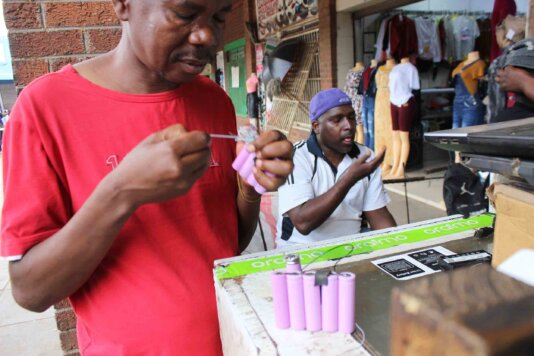- About
- Topics
- Picks
- Audio
- Story
- In-Depth
- Opinion
- News
- Donate
- Signup for our newsletterOur Editors' Best Picks.Send
Read, Debate: Engage.
| October 01, 2024 | |
|---|---|
| topic: | Renewables |
| tags: | #renewable energy, #e-waste, #Energy transition |
| located: | China, Zimbabwe, South Africa, Nigeria, Kenya, Malawi, Zambia |
| by: | Cyril Zenda |
With over two decades of experience in the trenches of Harare’s oldest suburb, Mbare, the veteran electronics technician has witnessed a full spectrum of poor imitations of – and even fake – green technology products. From phone batteries and power banks to domestic and industrial solar products like photovoltaic panels, batteries, and inverters, he has encountered everything from deceptive labelling and exaggerated capacities to poor-quality counterfeits and outright fakes.
“For this (particular) battery, it’s not unusual to find it stuffed with sand, glass, or some other cheap, weighty filler while the actual battery is just tiny… all to dupe unsuspecting buyers into thinking they’re getting the real deal,” December explained to FairPlanet.
As African communities – some of whose members have low literacy rates – seek to adapt to practices that mitigate the effects of climate change, such as irrigation, renewable power sources and conservation farming, they are investing in photovoltaic panels, solar batteries, inverters, solar water pumps, solar lights and other products. However, some unscrupulous suppliers import and sell poor quality and counterfeit products to unsuspecting consumers, most of whom lack the relevant knowledge and protection.
As in the case of December’s client, the cost of climate adaptation becomes high when end users discover their purchases to be either very poor quality or plain fakes supported by false claims and have to replace them.
Experts say this is a continent-wide problem as huge volumes of these products are imported into most African countries. According to Spoor & Fisher, a South African-based global legal practice specialising in trademarks, anti-counterfeiting, intellectual property, and other related litigation across Africa, most counterfeit goods come from the East, particularly China. At the same time, in recent years, a significant number have been manufactured on African soil.
“African countries are particularly vulnerable to the sale of counterfeit goods because so much commercial activity takes place in unregulated markets, borders can be easily breached, and resources for fighting counterfeiting are often inadequate,” Spoor & Fisher wrote in a report.
Rouse, a global Intellectual Property firm, also points to China as the major source of counterfeits. “China’s role in counterfeit trade cannot be overstated,” it wrote in a report. “Counterfeit goods from China are estimated to make up approximately 12.5 % of China’s total exports and over 1.5 % of its GDP. Several comparative analyses rank the country as the primary source of global counterfeit goods (around 75% of all counterfeits worldwide).”
Nick Redfearn, Rouse’s head of global enforcement, told FairPlanet that while they do not have specific data on individual African countries, their research has shown China to be the origin of most of these goods.
“We have a general estimate that 75% of the world’s counterfeit goods come from China. It’s higher for complex goods like electronics and lower for simpler products like clothing and toys,” said Redfearn.
China denies the charge, insisting that it faithfully fulfils its obligations as a World Trade Organisation (WTO) member to promote trade, including fighting trade in counterfeit products.
These poor-quality products, imported from India, Dubai, Pakistan and Indonesia, are usually counterfeits of reputable global brands. They are generally called “one-time” goods that consumers buy at their own risk. They are known as ‘zhing- zhong” in Zimbabwe, “fong kong” in South Africa, and “chinko” in Nigeria, among other derogatory terms across the continent.
According to the Standards Association of Nigeria (SON), the West African country, Africa’s biggest economy, loses an average of N15 trillion ($19,2 billion) a year to substandard goods. The South African Revenue Services (SARS) estimate that counterfeits cost the country not less than 100 billion rand ($5,3 billion) annually.
Research shows imports from China make up the bulk of counterfeit goods in Kenya, resulting in an estimated annual net loss of $368 million in trade. In addition, the Kenyan government spends more than $100 million yearly to prevent and track down counterfeits.
“Malawi is not spared, and consumers are losing a lot of money to repair and replace the products every time when they cease to function,” Julius Ng’oma, coordinator of the Civil Society Network on Climate Change (CISONECC) in Malawi, told FairPlanet. “Unfortunately, the poor who can’t afford durable but expensive equipment pay more.”
Kenya and South Africa are the only countries on the African continent with dedicated anti-counterfeiting bodies.
Natalie Gwatirisa, the founder of All For Climate Action (AFCA), a Zimbabwean youth-led non-profit that strives to raise awareness on climate change, cautioned against the products, which she said will soon result in the problem of electronic waste (e-waste).
“Africa should not just open its hand and receive (anything) from China because this is definitely going to lead to another landfill in Africa... Africa has to be mindful of what it is trading,” Gwatirisa told FairPlanet. “I am sure that e-waste will soon trend because it’s another issue (of concern). Think of those solar panels that charge phones; a lot of them do not work, so people throw them away. So, what will Africa be like in the next 20 years?”
SolarAid, a UK-based charity promoting solar power in Zambia, Malawi and other African countries, says that since 2010, an estimated 150 million solar products have been distributed throughout Africa, revolutionising electricity access for millions of off-grid and rural households. However, it is estimated that nearly 75 per cent of these products have stopped working, adding to the ever-growing e-waste problem.
To counter this, the charity has launched a programme to train locals to repair and recycle solar products within their communities.
“Through working with local communities and supporting local capacity training, the impacts of this programme are far-reaching,” the charity says. “It not only reduces electronic waste, lengthens product life and extends access to solar lights, it creates job opportunities, keeps money in the local economy, and builds stronger, more financially resilient communities.”
Ng’oma said imported substandard goods are flooding African markets because most countries lack adequate regulations, standards and enforcement.
“This situation does not help solve the African energy crisis… it only worsens the energy poverty, deforestation and forest degradation due to over-reliance on charcoal and firewood by citizens.” Said Ng’oma, adding that better quality goods would contribute to the green energy transition agenda.
The African Solar Industry Association (AFSIA) chief executive officer, John van Zuylen, told FairPlanet that as Africa increases the use of solar power, there is A need to ensure that standards are maintained in both the importation and the installation of the products.
“I think the real challenge is how different countries apply these standards and checks when allowing importation,” said van Zuylen. He noted that in residential, commercial and industrial solar installations, the problem may also be linked to poor installation skills on top of the equipment quality.
Rosemary Mpofu, the executive director of the Consumer Council of Zimbabwe (CCZ), wants to see poor-quality goods kept out of the country.
“There is need to curb smuggling at ports of entry, consumer awareness to adopt smart shopping trends, and a holistic approach by all sectors involved,” Mpofu said.
Zimbabwe is setting up a solar testing laboratory to weed out sub-standards of solar products from the market, while the Zimbabwe Energy Regulatory Authority is developing mandatory regulations that would stipulate minimum quality standards to which importers and retailers would have to conform for all solar equipment.
On its part, the South African Bureau of Standards (SABS), the national standards body of South Africa, says it has standards it promotes for green energy.
SABS’ Sadhvir Bissoon told FairPlanet that they have published many standards that address green energy needs and promote them through various marketing platforms to enhance their understanding and implementation by the industry.
“We create awareness of our conformity assessment services to the public and private sector,” Bissoon said. “We have a product certification scheme that enables a manufacturer to insert the SABS Mark of Approval on their products that assures the consumers, distributors and retailers that the products meet specific national quality standards.”
By copying the embed code below, you agree to adhere to our republishing guidelines.






